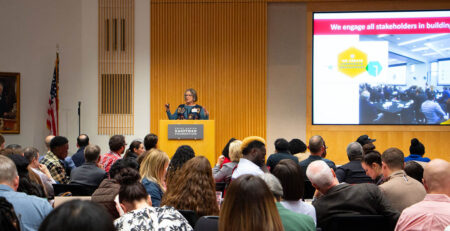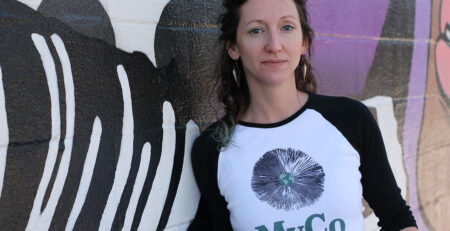15 Top Business Pitch Tips from KC Entrepreneurs Who Got Funded
Pitching your business is like crafting the perfect story. It’s an art that requires finesse, authenticity and a deep understanding of your audience. Whether you’re a seasoned entrepreneur or just starting your journey as a small business owner, the ability to pitch your business effectively can make or break your success.
We’ve gathered invaluable insights from experienced entrepreneurs who have navigated the world of business pitching and come out on top. Jackie Nguyen, Shelley Cooper and Brandy Archie, each with their unique perspectives and experiences, share their wisdom on what it takes to create a compelling business pitch that leaves a lasting impression.
- Jackie Nguyen is the founder and owner of Cafe Cà Phê. Her team won first-place honors at the 2022 Regnier Venture Creation Challenge. Cafe Cà Phê also won first place at the 2021 AltCap Your Biz: Pitch Competition.
- Shelley Cooper is the CEO of Diversity Telehealth. Cooper is a veteran of numerous local pitch contests, including Pure Pitch Rally and the AltCap Your Biz Pitch Competition. She is also a Digital Sandbox KC awardee.
- Brandy Archie is the founder and CEO of AskSAMIE. AskSAMIE is a Digital Sandbox KC awardee and won the top prize of $20,000 at the 2022 Pure Pitch Rally.
What are the key components of a successful business pitch?
Jackie: Practicing aloud is great practice. Being able to stand, speak aloud your story and listen to how your voice sounds is key. Practicing in front of friends, a mirror or even in an empty room helps get your nervous energy out. You’re able to hear sentences that either you resonate with or thought sounded great in your head but aloud sound terrible.
Most importantly though: Be authentic and be yourself. It is easier said than done, but if you can take a few seconds to take a deep breath, bring it back to yourself, that is when I’ve found the most success.
Shelley: Connecting with the audience is really important. In the very beginning, there are those frames and templates that you’re given — state the problem, state your solution, what is your traction, what your addressable market — and all those things are important. But if you don’t connect with the audience in the very beginning, they’re never going to get to that part.
Brandy: In addition to succinct and impactful storytelling, I think the other key components are tailoring your pitch custom to the audience that you are addressing. If you’re trying to reach your customers, talk to them in a language they understand. If you’re trying to reach the judges for a pitch competition or accelerator admission, then speak to how your business falls in line with their values and goals. Your ability to translate what you do into language that others can receive is the key.
What are some common mistakes entrepreneurs should avoid when pitching their business?
Jackie: Rushing through slides. Not telling a story. Being under prepared. Depending too much on slides, presentation, versus having everything in your brain and body prepared. There will always be technical difficulties. You cannot rely on those elements. You’ll have to be prepared to pitch under any circumstance. Have your notes written down on a piece of paper AND on your phone. What if there’s no Wi-Fi? What if your phone dies? You have your paper.
Shelley: One of the most common mistakes is people will have too much information on a slide or have too many slides in their pitch. These can be a death wish. I really like to tell a story as slides are going by and save the intricated details for the Q&A part of the pitch.
Brandy: Don’t make the pitch about you! I know it’s about your business and you developed it, but the true impact is the problem that your business is solving. So, connect with the audience right away and introduce yourself later. Talk about your team in a way that helps the audience understand why they are important and the right people for solving the problem.
How do you balance the need for detail with the need to keep your pitch concise?
Jackie: I put myself into the judges’ shoes. I think about why they’d want to invest in me. I think about the fact that they have no idea who I am, what my story is, what my store is like or my vibe, so I have to give all that to them in a very short time. I focus mainly on my story, my immediate needs, how winning the pitch/money could help my business and save the small details for the Q&A.
Shelley: It’s kind of like having different résumés for different jobs you’re applying for. For me, I started broadly marketing to hospitals and clinics, and then I narrowed that focus to federally qualified health centers and people with chronic diseases. As you narrow your focus, your images change, and the language in your pitch changes.
Brandy: Your pitch is like a first date. The goal is a second date, not a marriage proposal. Provide enough details so that the audience knows you are the right one for solving this problem and that you’re solving a big problem that they should care about. You want them to be ready to ask you questions about the details because that gets you to the second date.
Are there any specific resources or tools that have been particularly helpful in your pitch competition journey?
Jackie: Watching a few episodes of “Shark Tank” helps. For real. There are so many episodes on YouTube. Of course, these stakes are super high, but the concept is the same. What I love seeing in these episodes are the question-and-answer portions. This is when you are not prepared for what may be asked, so seeking composure in these moments is vital. Take notes when you watch the show. What were some great products that you resonated with? Was it the story? Was it the person’s ability to be themselves? What do you want to look and sound like?
Shelley: KCSourceLink and the Missouri Small Business Development Center have both been really helpful along with the Ewing Marion Kauffman Foundation. Kauffman provided a lot of help with the content in the slides.
And then, as part of getting accepted into Social Venture Studio, we were matched with a marketing company that helped us create better, cleaner slides that are more user friendly. There are a lot of resources here within Kansas City that can help you improve your pitch.
Brandy: Pitch at 1 Million Cups! They’re always looking for founder stories, and it’s a really helpful community because you get to pitch to people you don’t know. Pitching to your friends and family for practice is not always awesome because they love you too much. You need people who will be able to give you feedback but also don’t have experience with understanding your business.
Also, it’s great to do trial by fire. Sign up for as many pitch competitions as you can attend. The more practice the better because then you’ll get a chance to read the audience and see how well you are connecting; that way when the big opportunities come, you’ll feel more ready!
And if you can make it happen, connect with Eric Morgenstern. He is such a great nationally known expert at pitch coaching, and it’s amazing to have him as a resource right here in Kansas City.
Anything else that you’d like to share?
Jackie: Practice, practice, practice. I go through my story and slides at least a week or two before the competition. I ask my friends to review my pitch and ask them if they understood everything. Do not think about anyone else other than yourself and your own story. Everyone else is doing the same thing you’re doing — giving the best picture and presentation of their business in five minutes. It doesn’t matter if their product or story is similar to yours. What matters is if YOU can tell your story yourself.
Shelley: I always so nervous right before I’m about to pitch, so like to go first if I can. Of course, not everyone can go first, but I find it eases my anxiety to get it out of the way sooner rather than later.
Brandy: Don’t forget to use your own voice. Part of connecting with the audience is that they can relate to you in some way, so do whatever you can to make yourself feel as comfortable as possible so that your personality shines through.




